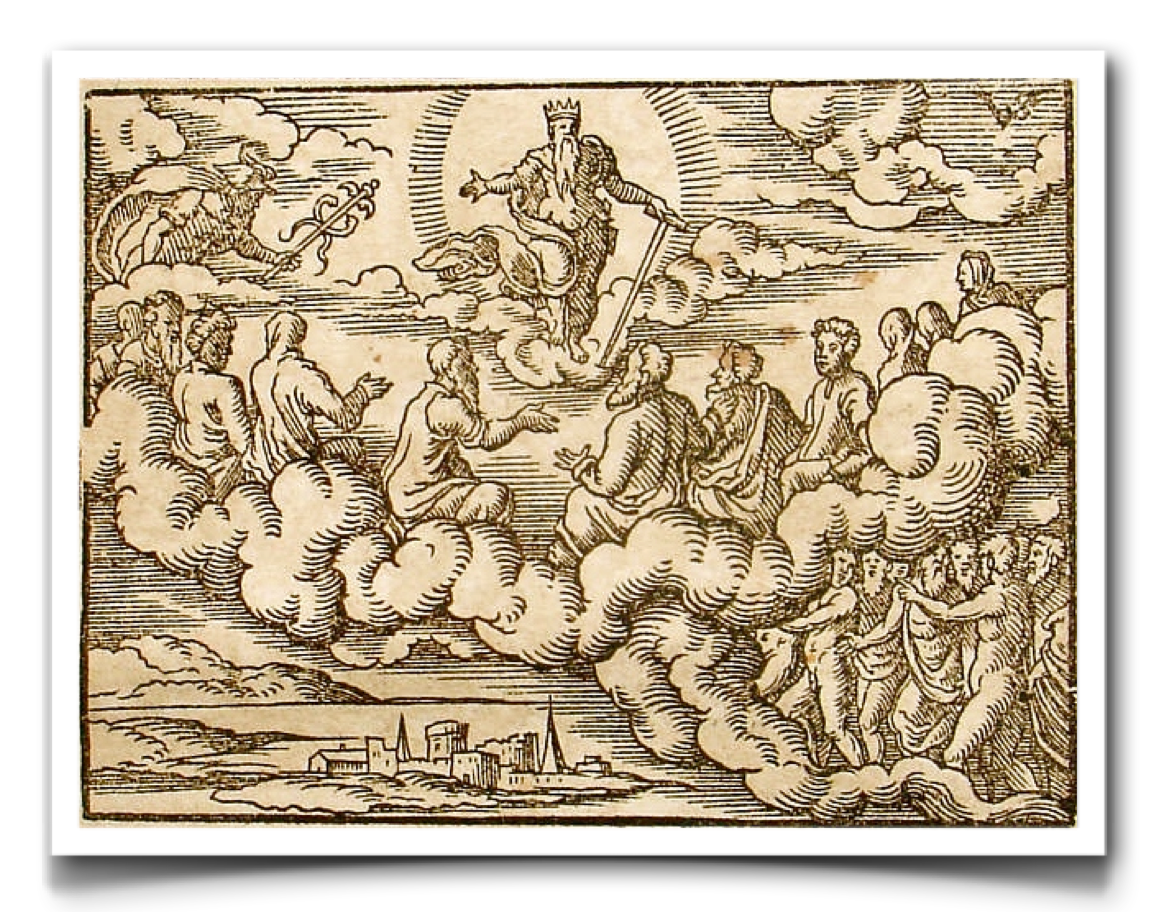 |
| Council of Gods before the Deluge Engraving by Virgil Solis for Ovid's Metamorphasis |
McCann points out that the key root word in Psalm 82--which is also a key word for the psalter and prophetic literature of the OT--is translated in English as "justice," and occurs four times in the short eight verses of this psalm (122-123). It is what God does to the other gods (holds them in judgment, vs. 1), accuses them of being unjust judges (vs. 2), reminds them of what true justice is (giving justice to the weak and orphan, vs. 3), and eventually, it is the key to the prayer of the psalmist (vs. 8). It is fair to say that Psalm 82 is a psalm about justice that provides us with a working definition of God's justice.
In verses 3 and 4, we hear what the gods should have been doing: caring for those people who cannot fully care for themselves and defending those who seek to exploit them. This divine council has not been meeting expectations, but instead, they "walk in darkness" (vs. 5). But instead of just being an inept cast member on a reality television show that ultimately has no consequence, these gods' negligence has caused real strife. Namely, they have caused the earth to fall apart. McCann writes that verse 5 suggests that "injustice is the undoing of creation. Where injustice exists, the world--at least the world as God intends it--falls apart. Injustice--any situation in which some people live at the expense of others--is incompatible with life as God intended it for the creation" (124).
So, in the words of Donald Trump, "You're fired." Right? Right. And that is the incredible movement of this psalm. God is so concerned with the plight of those who are oppressed, suppressed, and powerless that God will remove every power that oppresses, suppresses, and tamps them down. To participate in injustice, or even to be blind to it (as verse 5b may suggest) is to have failed to carry out the will of God. And in that case, God will fire you.
Verse 8, however, reveals another layer to Psalm 82. A short prayer follows this scene, a prayer of the psalmist popping up to call on God. To me, this movement illuminates the fact that Psalm 82 is the function of an active theological imagination--an imagination that takes the witness of the Hebrew Scriptures very seriously; that integrates them seamlessly into a mythological worldview that would not have been uncommon in the Ancient Near East. McCann focuses on the theological message of this psalm--that God's ultimate will for creation is the establishment of justice by caring for those who are in need. In class, we discussed how Jesus, as the fullest revelation of God's will, as he did work for justice in the ways outlined in verses 3 and 4, is fully divine. However, I think that this final verse has something important to say about the anthropology of the Psalms.
Mays writes that false gods are always with us: "The ancient gods have not disappeared. They have simply assumed different shapes and faces" (Preaching 151). He describes the hold that the gods of the middle-class capitalist culture. "Such gods are always with us," he writes (151), "always a part of the human predicament, the ceaseless art of our feverish genius for evading the actual divine human encounter with the Father of Jesus Christ" (Preaching 151). But here's the interesting part...at the end of Psalm 82, in that last verse, in that fervent prayer for God to come and establish justice in the places where injustice threatens to destroy creation, the psalmist reveals that he is not evading the divine human encounter...he is crying out for it.
In imagining God in the midst of the divine council, the psalmist has already begun to imagine a way in which the world may be put together in a better, more just way--a way that corresponds with God's will. Strawn points out that the psalmist's picture emphasizes the "close connections drawn throughout the psalm between heaven and earth" (82). He draws a parallel between today's boardroom or judge's chambers. Certainly, it is so easy to become disillusioned with the world today, to only see injustice, to become frustrated with the oppressive systems that rend the fabric of our communities. But Psalm 82 gives humanity a starting point--to look past the hopelessness of the situation into the reality that God stands in the midst of the unjust gods of our time and to pray the prayer that concludes the Psalm--"Rise up, O God..."
How God rises up isn't so easy to imagine. But Psalm 82 assures us that recognizing that God's mercy and power are present in these situations may just give us eyes to see what else God is doing to establish justice in our midst.

No comments:
Post a Comment